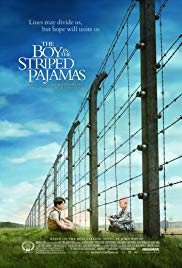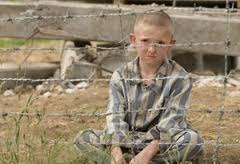See Questions Suitable for Any Film That is a Work of Fiction.
1. In the opening scene of the film, boys are running happily through an upper-class area of Berlin. They run past a group of Jews carrying their meager belongings being herded into a truck. What irony can be found in this scene?
Suggested Response:
There are several levels of irony. The first is that by the end of the film, Bruno will suffer the same fate as the people being ignored. The second is that many of the prosperous German children and adults who are ignoring the destruction of the lives of the Jews will, in a few years, suffer a similar fate when the Allies reduced large parts of German cities to rubble.\
2. What ethical problem is foreshadowed when Bruno’s father tells him, “Life is more about duties than choices?”
Suggested Response:
Answers will vary. Students should be able to note that choices are made in part by considering the ethics of the proposed action. When people do not take their own ethics into account, they are abandoning the obligation to act ethically. Bruno’s father is little more than a slave if he believes he has no choice in the actions that he takes and if he leaves it up to others to make decisions for him. Some students may suggest that adherence to duty, for example to one’s country in time of war, disallows all ethical considerations. However, even in warfare there are ethical decisions to be made by common soldiers as well as by leaders. For example, U.S. soldiers are instructed that they are not to obey an order from a superior instructing them to commit a crime against humanity or a war crime.
3. When Bruno’s father comes down the elegant staircase in his home, he is met by the classic Nazi salute. His mother sneers and asks him if he is still that little boy who loved dressing up. She asks him if uniforms still make him feel special. What is she suggesting here?
Suggested Response:
Bruno’s father has been promoted to commandant of a death camp and is being honored for the distinction. His mother is clearly opposed to the Hitler regime and seems to be saying that the participants are little boys who need attention.
4. When Bruno sees people in striped pajamas across a fence that he assumes marks the boundary of a farm, he questions his father and is told that they are inferior beings and not worth being considered as people. Later Bruno hears the sentiment echoed by his tutor. How is this concept important to any genocide and what causes Bruno to see things differently?
Suggested Response:
Genocides occur when society denies the humanity of a minority and decides to exterminate the minority. This conception of the Jews is never really adopted by Bruno. Incidents that cause Bruno to see things differently from his father and his society include his meeting with Pavel, the man who works as a servant in his home and who is wearing the Striped pajamas under his servant’s clothing. Pavel helps Bruno make a tire swing and when Bruno is injured, Pavel dresses the wound. Bruno learns that Pavel was a doctor before working as a servant. Later, Bruno meets Shmuel and is happy to have a friend his own age. Learning about them, Bruno does not see these two individuals as different, non-human, or inferior. Thus, the suggestion is made that knowing an individual can shift the attitude about a group that is held by society.
5. Gretel, Bruno’s sister, is seen several times with her dolls and then one day Bruno finds the discarded dolls ominously piled into a dark corner of the cellar. What does this image tell the film’s viewers about the changes the girl is experiencing?
Suggested Response:
Gretel is losing her innocence. She has developed a crush on the German soldier, Karl, who guards her home and washes the cars. She wants to impress him. She accepts the anti-Semitic propaganda she reads with her tutor without question and fills the wall space of her room with Nazi posters. The image of the discarded dolls in the cellar creates a powerful symbol for her lost compassion.
6. His tongue loosened by alcohol, Karl reveals information about his father’s exodus from Germany. This information threatens Karl, despite his clear loyalty to the Nazi party and his role in the household as the brutal disciplinarian of the camp inmates who serve the household. What is revealed about Karl’s cruelty in his brutal attack on Pavel, the servant who spills wine at the dinner table. Why does Karl beat Pavel so brutally? What is the irony in what happens to Karl in this story?
Suggested Response:
Karl understands that he has talked too much and takes his fears out on the old man by beating him brutally as the family continues its meal in the next room. In addition, Karl is trying to demonstrate his hatred of Jews and his loyalty to Nazi principles. However, Karl’s fate is cast by his admission that he did not report his father to the authorities. Bruno’s father then reports Karl and the young man is transferred to the Eastern front where he will likely be killed. The irony in what happens to Karl is that he is trying to live up to the Nazi ideal, but it is those ideals that send him to his likely death.
7. The beating of Pavel serves as a turning point for Bruno’s mother who is increasingly opposed to her husband’s work in the military. What solution does her husband offer to help her cope with her disillusion and fear?
Suggested Response:
Bruno’s father decides to send his family to live with an aunt in Berlin. He seems to think that being away from the situation will make his wife feel better. He is unwilling to accept her beliefs, as he was unwilling to accept his mother’s beliefs. He chooses to offer a distraction rather than a solution to the problem.
8. What is revealed in the characters of both Bruno and Shmuel in the episode in which Karl finds the two boys together in the family home and questions their actions?
Suggested Response:
When Karl demands to know where Shmuel got the food he is eating, Bruno is afraid and lies, thus betraying his friendship with Shmuel. Shmuel is beaten and sent back behind the barbed wire. When Bruno apologizes to Shmuel for his betrayal, he is readily forgiven. This shows both the fear in which Bruno is living and his growing awareness of his father’s complicity in the misery suffered by Pavel as well as Shmuel. It also shows the innocence of children in the ease with which they can forgive. It indicates the importance of forgiveness and loyalty in friendship, which can surpass betrayal.
9. An important element of irony can be seen when Bruno spies on the viewing of the propaganda film which shows the camps to be comfortable places where Jews are treated fairly and not made to suffer the hardships that truly existed. Bruno knows the difference and is disturbed. What is revealed in this scene?
Suggested Response:
Bruno is beginning to understand but is still fighting the reality that is unfolding around him. His mother is fading as she grows increasingly disturbed by her husband’s role in maintaining the camp. Bruno no longer feels proud of his father. Bruno is struggling to make sense out of two conflicting views of reality. His innocence is slowly starting to give way.
10. The film’s final episode is filled with several stark ironies. List three of the ironies.
Suggested Response:
Here are several ironies in the final episode. There may be more. It is ironic that while the family is preparing to move the children to Berlin for safety, Bruno is preparing to move into danger by entering the camp to help his friend Shmuel find his father. It is ironic that the goal of Bruno’s father in his work is to kill Jewish people in the gas chambers and his son becomes a victim of one of those gas chambers. It is ironic that Bruno’s effort to help his friend Shmuel, a loving and selfless act of friendship, will result in Bruno’s death. It is ironic that some of the men herding the Jews into the camp are inmates, wearing the same striped pajamas as the people they are hearding to their deaths, and that their own fates are not assured by this betrayal.
11. The plot of this film turns on one basic irony that is central to an important theme of the work. What is it? Can you identify any other stories in which the plot turns on a major irony that is central to an important theme?
Suggested Response:
The overriding irony in “The Boy in the Striped Pajamas” is that Bruno dies in a death camp which his father is administering for the purpose of killing Jews. This irony is important to the theme that if you commit wrong to others, you or persons dear to you may suffer as a result. Note that there is no one correct way to describe the theme, but that it must relate to the fundamental irony of Bruno’s death in the gas chambers. There are may stories in which the plot turns on a basic irony that is central to an important theme. Here are a few: Cyrano de Bergerac; To Kill a Mockingbird; All My Sons; Billy Budd; The Scarlet Letter; and Fahrenheit 451.



